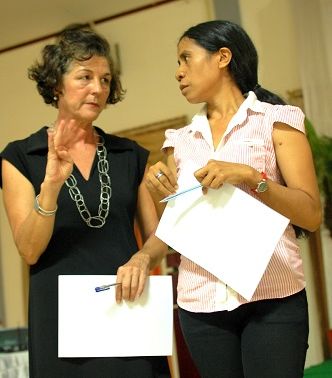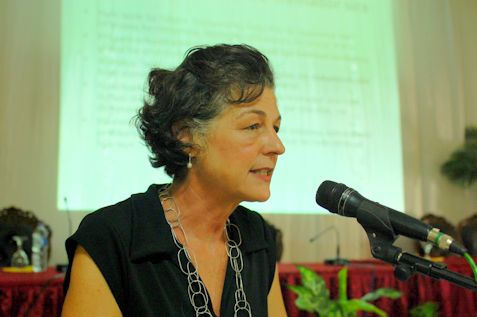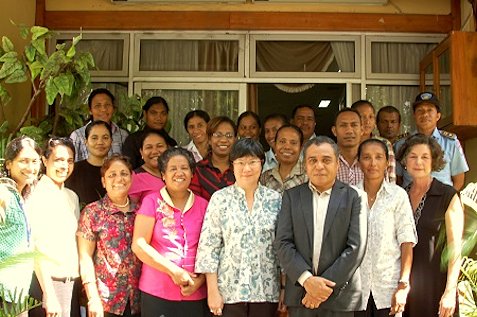Timorese Partners Discussed Enhanced Opportunity of Women’s Participation in Peace Building
Date:
“Women know their rights, but there are some men who put women’s rights below their own. We need to create a culture where women and men have equal rights in reality. If they are not equal in the community, women are created as victims, victims of violence, in life,” said Julio Da Costa Correia of the Association of Men against Violence (AMKV).

Ms. Theresa da Langis (left) and the participant facilitate the group discussion.
Credit: UN Women/Misato Aonami
Mr. Da Costa Correia participated in a Training of Trainers (TOT) workshop that took place from 21-25 October 2013 in Dili, Timor-Leste, supported by UN Women to provide information about violence against women and encourage the participants to facilitate peace building in Timor-Leste. The workshop was held as part of the Women, Peace and Security multi-country programme funded by the Department for International Development (DFID) of the Government of Canada, European Union (EU), and the Australian Agency for International Development (AusAid).
After 24 years of Indonesian occupation, efforts in Timor-Leste have been devoted to post-conflict peace building, especially in the facilitation of the participation of women in this 12-year old Democratic Republic. Security Council resolution 1325, adopted in 2000, has led into extensive work on ensuring that women’s peace building accomplishments are recognized, and that women are given equal rights to demonstrate their knowledge on matters related to conflict transformation.
The training of trainers workshop emphasized the significance of the four pillars required to design plans for lasting peace; prevention, participation, protection and access to justice. It also focused on peace building organizations sharing information to encourage each other and build a foundation for a joint training package to be used by 27 governmental and civil society partners.
“The training was good because we learned some new things [about Women, Peace and Security]. I can implement these things in the districts, specifically with prevention. It is important to prevent what might happen in the future because violence is a cycle,” continued Mr. Da Costa Correia.
So why is women’s peace building so significant? The reason is clear; women make decisions everywhere at all levels - from the family to elected and appointed offices in both political and economic life.

Ms. Theresa da Langis, Women, Peace and Security expert at UN Women, giving presentation to participants about how to utilize the four pillars when training others. Credit: UN Women/Misato Aonami
“Participation is like a door: it opens new opportunities for women to enjoy human rights. Decision-making is the key to that door to ensure women are participating on their own terms and that their perspectives and needs are accounted for. Participating without decision-making power can too easily become exploitative or tokenism,’’ declared Theresa de Langis, women, peace and security expert consultant for UN Women.
The workshop provided useful information to deepen the participants’ knowledge on how to incorporate women in peace building, but also encouraged the participants. “Now as a facilitator, I can help communities build capacity and do advocacy for prevention activities in the community, and talk to women about how to protect themselves from conflict, how to prevent conflict, and how to engage with women so they can participate in the post-conflict agenda,” stated Laura Pina, Manager of Patria.

Participants at the Training of Trainers workshop.
Credit: UN Women/Misato Aonami